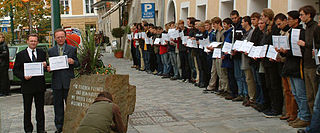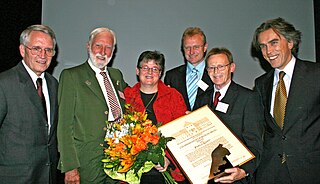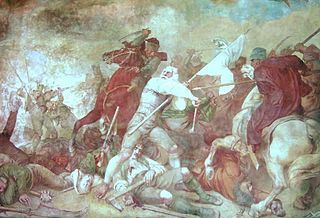
The Sound of Music is a musical with music by Richard Rodgers, lyrics by Oscar Hammerstein II, and a book by Howard Lindsay and Russel Crouse. It is based on the memoir of Maria von Trapp, The Story of the Trapp Family Singers. Set in Austria on the eve of the Anschluss in 1938, the musical tells the story of Maria, who takes a job as governess to a large family while she decides whether to become a nun. She falls in love with the children, and eventually their widowed father, Captain von Trapp. He is ordered to accept a commission in the German navy, but he opposes the Nazis. He and Maria decide on a plan to flee Austria with the children. Many songs from the musical have become standards, such as "Edelweiss", "My Favorite Things", "Climb Ev'ry Mountain", "Do-Re-Mi", and the title song "The Sound of Music".

Baron Georg Johannes Ludwig Ritter von Trapp was an Austro-Hungarian Navy officer and the patriarch of the Trapp Family Singers, whose lives were the inspiration for the play and movie The Sound of Music. His naval exploits during World War I earned him numerous decorations, including the prestigious Military Order of Maria Theresa. Under his command, the submarines SM U-5 and SM U-14 sank 13 Allied ships totaling about 45,669 gross register tons (GRT).

Baroness Maria Augusta von Trapp DHS was the stepmother and matriarch of the Trapp Family Singers. She wrote The Story of the Trapp Family Singers, which was published in 1949 and was the inspiration for the 1956 West German film The Trapp Family, which in turn inspired the Broadway musical The Sound of Music (1959) and its 1965 film version.
AMAG is the biggest company in the Austrian Aluminium industry sector. It is situated in the village of Ranshofen, which is in Braunau am Inn.
Andreas Maislinger is an Austrian historian and founder of the Austrian Holocaust Memorial Service and Braunau Contemporary History Days.
Wertheimer is an Ashkenazi Jewish surname:

The Innviertel is a traditional Austrian region southeast of the Inn river. It forms the western part of the state of Upper Austria and borders the German state of Bavaria. The Innviertel is one of the four traditional "quarters" of Upper Austria, the others being Hausruckviertel, Mühlviertel, and Traunviertel.

The House of Responsibility in Braunau am Inn (HRB) is a concept to establish an international meeting place for young people to work on projects about the past, present and future in Hitler's birth house. The house is located in the upper-Austrian town of Braunau am Inn. The former tavern was a cultural center for the Nazi party during the Third Reich. After the heritage house was used as a homestead as well as a workshop for people with disabilities it is now standing empty since 2011.

Gerhard Skiba of the Austrian Social Democratic Party was elected mayor of the city of Braunau am Inn in 1989. He became internationally known after setting up a memorial stone for the victims of Fascism in front of the house where Adolf Hitler was born.
Egon Ferdinand Ranshofen-Wertheimer was a diplomat, journalist, doctor of laws and state.
Austrian Americans are Americans of Austrian descent. According to the 2000 U.S. census, there were 735,128 Americans of full or partial Austrian descent, accounting for 0.3% of the population. The states with the largest Austrian American populations were New York (93,083), California (84,959), Pennsylvania (58,002), Florida (54,214), New Jersey (45,154), and Ohio (27,017). This may be an undercount, as many German Americans have ancestors from Austria, the Austrian Empire or the Austro-Hungarian Empire, which was a major source of immigrants to the United States before World War I. Before World War I, by which time a large percentage of Germans had immigrated to the United States, Austrians were often categorized as German people, largely because of their shared cultural-linguistic and ethnic origin and Austria being one of many historical German states of the Holy Roman Empire of the German Nation.

Maria Agatha Franziska Gobertina von Trapp was the second-oldest daughter of Georg von Trapp and his first wife, Agatha Whitehead von Trapp. She was a member of the Trapp Family Singers, whose lives inspired the musical and film The Sound of Music. She was portrayed by Heather Menzies as the character "Louisa". She died at age 99, and was the last surviving sibling portrayed in the film.

Trapp Family Austrian Relief, Inc. is an initiative founded by Georg von Trapp and Maria von Trapp.
The Braunau Contemporary History Days are a series of conferences organised by the association for contemporary history. Scientifically guided by Andreas Maislinger, it has annually taken place in Braunau am Inn since 1992.
Ammerer Bed Company is an Austrian family business in the eighth generation. The enterprise is active in sleeping systems, textile arrangements and lingerie.

Johanna Karolina (Franziska) von Trapp was the sixth child of Georg Ritter von Trapp and his first wife, Agathe. She was a member of the Trapp Family Singers, whose lives were the inspiration for the play and film The Sound of Music. She was portrayed as the character "Marta".
Arts Initiative KNIE was founded as an initiative for contemporary art in 1995 in Oberndorf bei Salzburg. It is the origin of the stolperstein project in Braunau am Inn District.

The Bavarian uprising of 1705–06 was a revolt against the occupation of the Electorate of Bavaria by the forces of the Austrian Habsburgs during the War of Spanish Succession (1701–14). It lasted from early November 1705 to 18 January 1706, approximately 75 days. Henric L. Wuermeling speaks of this as "the first revolution of modern history."
















